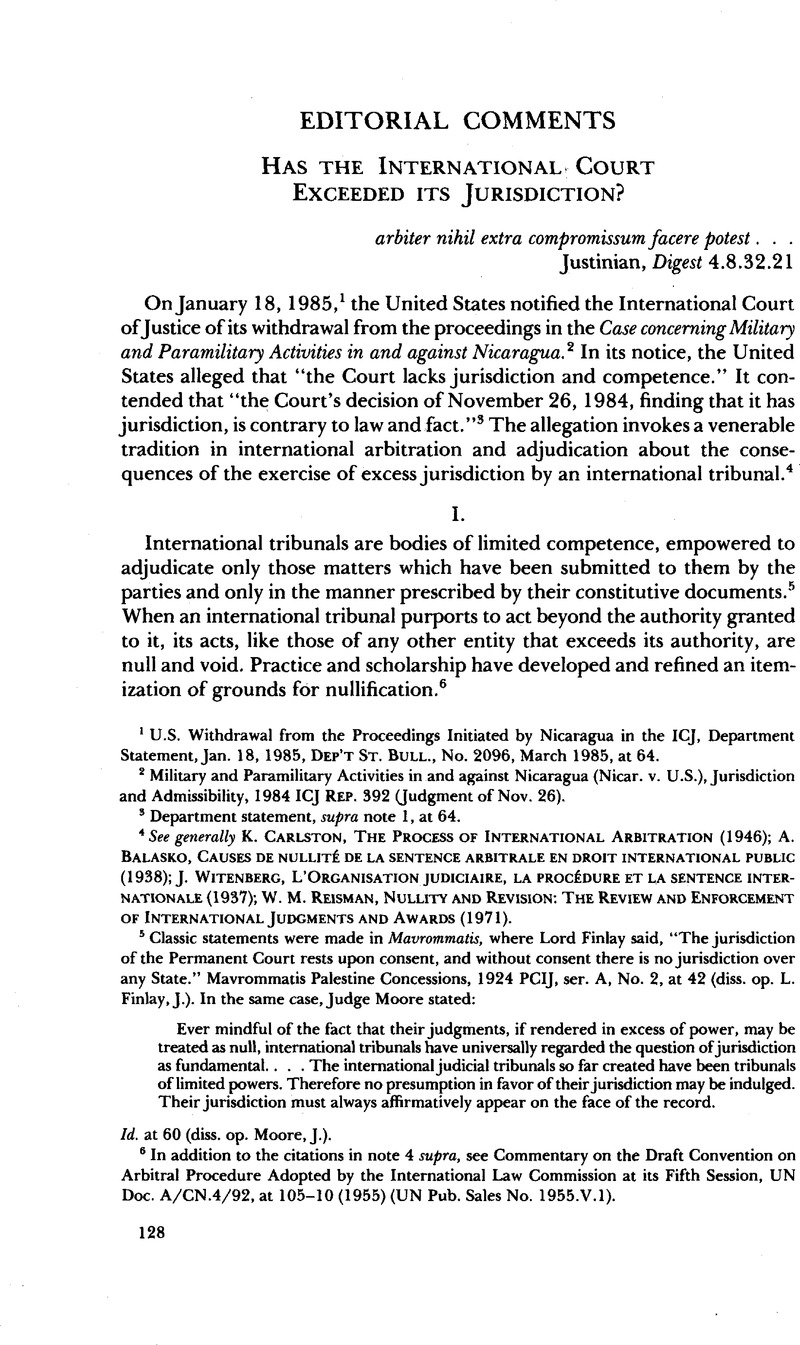Article contents
Has the International Court Exceeded its Jurisdiction?
Published online by Cambridge University Press: 27 February 2017
Abstract

- Type
- Editorial Comments
- Information
- Copyright
- Copyright © American Society of International Law 1986
References
1 U.S. Withdrawal from the Proceedings Initiated by Nicaragua in the ICJ, Department Statement, Jan. 18, 1985, Dep’t St. Bull., No. 2096, March 1985, at 64.
2 Military and Paramilitary Activities in and against Nicaragua (Nicar. v. U.S.), Jurisdiction and Admissibility, 1984 ICJ Rep. 392 (Judgment of Nov. 26).
3 Department statement, supra note 1, at 64.
4 See generally Carlston, K., The Process of International Arbitration (1946)Google Scholar; Balasko, A., Causes de Nullité de la sentence arbitrale en droit International Public (1938)Google Scholar; Witenberg, J., L’organisation Judiciaire, La Procédure et la Sentence Internationale (1937)Google Scholar; Reisman, W. M., Nullity and Revision: The Review and Enforcement of International Judgments and Awards (1971)Google Scholar.
5 Classic statements were made in Mavrommatis, where Lord Finlay said, “The jurisdiction of the Permanent Court rests upon consent, and without consent there is no jurisdiction over any State.” Mavrommatis Palestine Concessions, 1924 PCIJ, ser. A, No. 2, at 42 (diss. op. L. Finlay, J.). In the same case, Judge Moore stated:
Ever mindful of the fact that their judgments, if rendered in excess of power, may be treated as null, international tribunals have universally regarded the question of jurisdiction as fundamental.. . . The international judicial tribunals so far created have been tribunals of limited powers. Therefore no presumption in favor of their jurisdiction may be indulged. Their jurisdiction must always affirmatively appear on the face of the record.
Id. at 60 (diss. op. Moore, J.).
6 In addition to the citations in note 4 supra, see Commentary on the Draft Convention on Arbitral Procedure Adopted by the International Law Commission at its Fifth Session, UN Doc. A/CN.4/92, at 105–10 (1955) (UN Pub. Sales No. 1955.V.1).
7 7 UN GAOR Supp. (No. 9) at 7, UN Doc. A/2163 (1952).
8 I. Shihata, The Power of the International Court to Determine its own Jurisdiction: Compétence de La Compétence 11 (1965).
9 See [1958] 1 Y.B. Int’l L. Comm’n 43–46, UN Doc. A/CN.4/SER.A/1958; for a concise summary of the debate, see I. Shihata, supra note 8, at 11 and n.4.
10 Commentary, supra note 6, at 105.
11 Art. 30, id.
12 Id.
13 1984 ICJ Rep. at 442, para. 113.
14 Id. at 427, para. 81.
15 Separate Opinion of Judge Ruda, id. at 452, 454, para. 12.
16 Emphasis added. Judge Nagendra Singh was able to dispel for himself any lingering disquiet on this point by finding significance in the fact “that the jurisdictional clause of Article XXIV of the Treaty does not specify the exclusion of Article XXI from the Court’s jurisdiction.” Separate Opinion of Judge Nagendra Singh, id. at 444, 446–47.
17 Id. at 442, para. 113.
18 Id. at 403–04, para. 25.
19 Case concerning the Arbitral Award made by the King of Spain on 23 December 1906 (Hond. v. Nicar.), 1960 ICJ Rep. 192 (Judgment of Nov. 18).
20 1984 ICJ Rep. at 404–08, paras. 27–35.
21 Article 36(5) provides:
Declarations made under Article 36 of the Statute of the Permanent Court of International Justice and which are still in force shall be deemed, as between the parties to the present Statute, to be acceptances of the compulsory jurisdiction of the International Court of Justice for the period which they still have to run and in accordance with their terms.
22 1984 ICJ Rep. at 403–04, para. 25.
23 Id. at 405–08, paras. 29–35. For confirmation of its interpretation, the Court relied on the “conduct” of international organizations (id. at 408–09, para. 36). For an examination of the fallacy in this reasoning, and its implications, see M. Reisman, Dissemination of Information by International Organizations: Reflections on Law and Policy in the Light of Recent Developments, Vict. U. Wellington L.J. (forthcoming).
24 Doc. Jurist 41, G/31, 14 UNCIO Docs. 289 (1945) (emphasis added), cited in Dissenting Opinion of Judge Schwebel, 1984 ICJ Rep. at 558, 571, para. 18, and Separate Opinion of Judge Jennings, id. at 533, 536.
25 1984 ICJ Rep. at 421, para. 65.
26 Id. at 424, para. 73.
27 Id. at 429–41, paras. 84–108.
28 Military and Paramilitary Activities in and against Nicaragua (Nicar. v. U.S.), Declaration of Intervention, 1984 ICJ Rep. 215 (Order of Oct. 4).
29 See Separate Opinion of Judges Ruda, Mosler, Ago, Jennings and de Lacharrière, id. at 219.
30 Judgment of Nov. 26, Separate Opinion of Judge Oda, “Opening Remarks,” 1984 ICJ Rep. at 471, 472.
31 E.g., by Judge Oda, id.
32 Military and Paramilitary Activities in and against Nicaragua (Nicar. v. U.S.), Provisional Measures, 1984 ICJ Rep. 169 (Order of May 10). See, in this regard, Reisman, , Accelerating Advisory Opinions: Critique and Proposal, 68 AJIL 648 (1974)Google Scholar.
33 W. M. Reisman, supra note 4, at 861.
34 Case concerning the Northern Cameroons (Cameroon v. UK), Preliminary Objections, 1963 ICJ Rep. 15, 65 (sep. op. Spender, J.) and 97 (sep. op. Fitzmaurice, J.) (judgment of Dec. 2).
35 1914 Foreign Relations of the United States 1000, 1014, cited in K. Carlston, supra note 4, at 64.
36 Northern Cameroons, Declaration of Judge Koretsky, 1963 ICJ Rep. at 39, 40.
37 Instructions to the American Delegates to the Hague Conference, May 31, 1907, 1907 Foreign Relations of the United States, pt. 2, at 1128, 1135.
- 5
- Cited by




